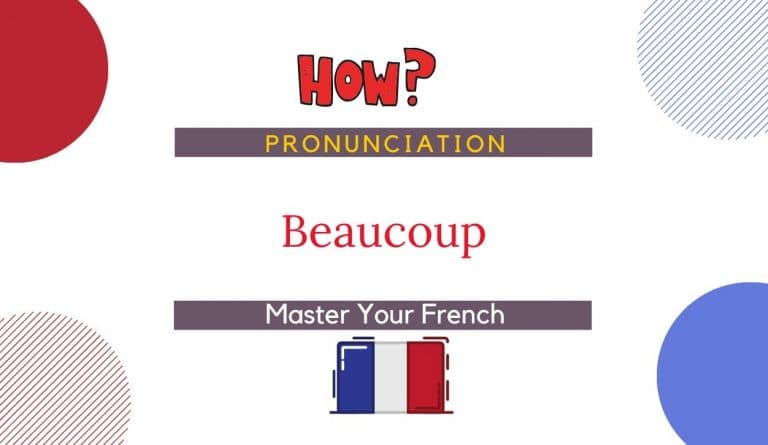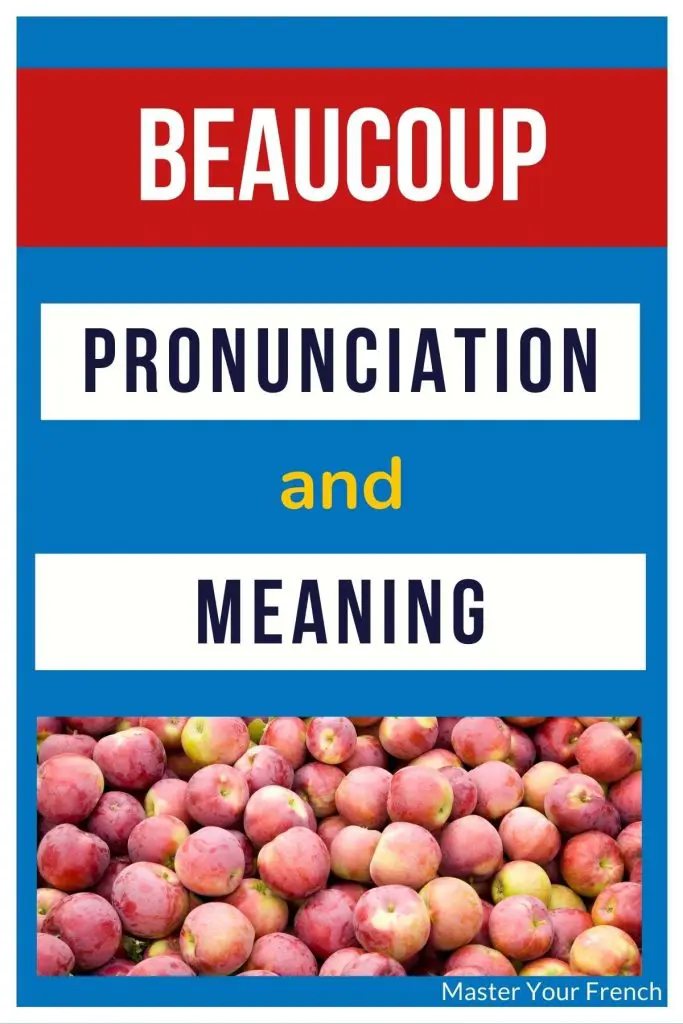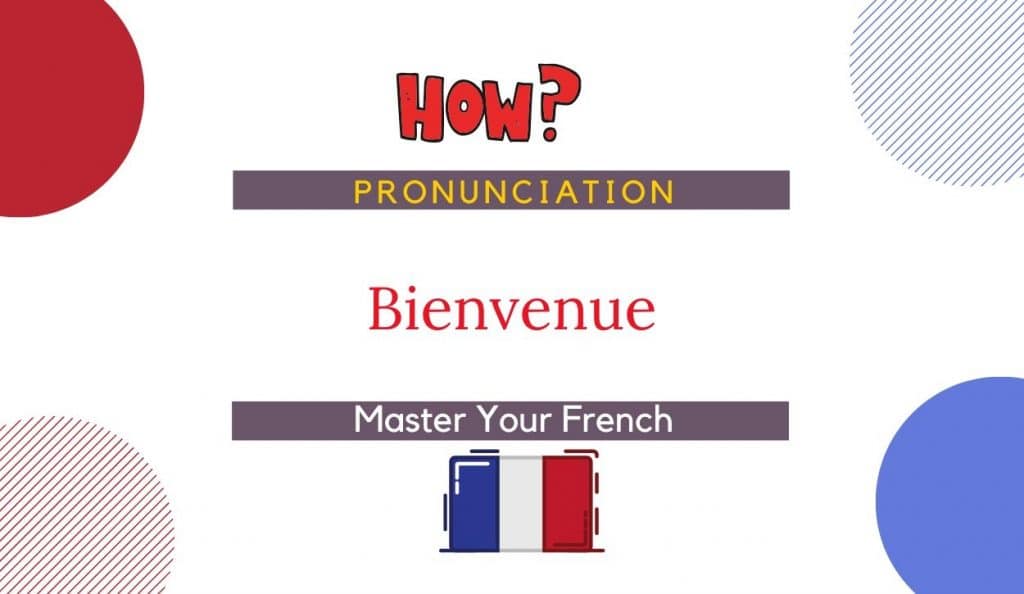How to pronounce Beaucoup in French?
Updated: 13 March, 2021 by Mylene in How to Pronounce ▪

Beaucoup in French
Beaucoup is an adverb in French that means a lot or much in English. Beaucoup means something is great in quantity or amount.
The following sentences include the word beaucoup. For instance:
- Merci beaucoup: Thank you very much!
- Il pleut beaucoup aujourd’hui: Today it’s raining a lot.
- Il aime beaucoup ses enfants: he loves his children a lot.
Beaucoup is often used with the word “de” if you want to say “many” in French. For example:
- Il y a beaucoup de monde: There are a lot of people.
- J’ai beaucoup de temps: I have a lot of time.
In this article you’ll learn the correct pronunciation of beaucoup, you’ll better understand whether you should use a verb in singular or plural and you’ll discover new expressions with the word beaucoup.
How to pronounce “Beaucoup” in French?
In French, beaucoup is pronounced as follows /boku/. In details:
- /b/ sound: Your lips are closed and placed against one another. Vibrate your vocal cords, and push air out of your mouth against your closed lips. Release the air in one moment, as your vocal cords continue to vibrate.
- /o/ sound: The tongue is back, the mouth is slightly open and the lips are rounded.
- /k/ sound: Lift the back of your tongue and press it against the soft palate, above your throat. Push air out of your throat, stopping it briefly behind your tongue before releasing it. Your vocal cords do not vibrate while making this sound.
- /u/ sound: The tongue is back, the mouth is open and the lips are rounded.
The last letter p is not pronounced. It is a silent letter.
Note that the letters “eau” are always pronounced /o/.
This Instagram video will show you how to pronounce beaucoup in French.
It’s part of the Effortless French Words Pronunciation series.
Click the link to listen to this video or directly play the video shown below.
Beaucoup: Singular or Plural?
Literally beaucoup means “a great stroke” from beau “fine” and coup “a stroke”. The verbs can be singular or plural.
Beaucoup is used alone
When beaucoup is used alone in French then the verb must be plural. In this case, beaucoup means a lot of people or a lot of things. For example:
- Beaucoup regretteront ton départ: Many people will regret your departure.
Beaucoup is followed by a noun in singular
If beaucoup is followed by a noun in singular then the verb must be singular. For example:
- Beaucoup d’eau a coulé sous les ponts: a lot of water has gone under the bridge.
- Beaucoup de temps a passé depuis notre dernière rencontre: Much time has passed since our last meeting.
Beaucoup is followed by a noun in plural
When “beaucoup de” is followed by a noun in plural, then the verb can be singular or plural. Let’s see these two cases.
Case 1: Singular
If you want to focus on the whole thing, you should use a verb in the singular. For example:
- Beaucoup de papiers éparpillés donne une impression de désordre: Lots of scattered papers give the impression of disorder.
As you can see “donne” is the singular form of the French verb “donner”.
Case 2: Plural
When beaucoup highlights the number, therefore the verb is in the plural form. For example:
- Beaucoup de touristes sont arrivés hier: a lot of tourists arrived yesterday.
In this case, “sont” is the plural form of the verb “être”.
Expressions related to Beaucoup
Let’s learn some expressions with the word beaucoup. The following expressions can mean a lot, much less or not so much.
Beaucoup means a lot
In the following expressions, beaucoup means a lot.
- de beaucoup: significantly
Mon frère est grand maintenant, il me dépasse de beaucoup: my brother is tall now, he is much taller than me. - avoir beaucoup à faire: having a lot to do
Je dois partir à 8h00 mais j’ai beaucoup à faire avant: I must leave at 8pm but I still have a lot of things to do. - se donner beaucoup de mal: go to a lot of trouble
Nous nous donnons beaucoup de mal pour le sortir de cette situation: We go to a lot of trouble to help him. - il y est pour beaucoup: he played a big part in it
J’ai pu finir mon travail, il y est pour beaucoup: I could finish my work, he played a big part in it. - c’est beaucoup de: it’s a lot of
Construire une maison, c’est beaucoup de travail: It’s a lot of work to build a house. - être beaucoup pour quelqu’un: represent a lot for someone
C’est mon deuxième père, il est beaucoup pour moi: it’s my second father, he means a lot for me. - faire couler beaucoup d’encre: to lead extensive press coverage
Cette affaire a fait coulé beaucoup d’encre: Much has been written on this matter.
Un peu beaucoup
Familiar expression: “un peu beaucoup” which means trop, excessivement. For example:
- Je l’aime un peu beaucoup: I love him too much
Beaucoup means not so much
In the following expressions beaucoup means it should be not so much:
- “C’est beaucoup dire” means “ce serait excessif de le dire”: it would be excessive to say that.
Beaucoup means much less
In the following expressions beaucoup means much less:
- beaucoup moins de: much less
Nous avons eu beaucoup moins de pluie qu’hier: We have much less rain than yesterday.
Let’s connect
To go beyond this effortless French pronunciation post, follow me on Instagram for daily French practice. Subscribe to my channel on YouTube for more awesome French content.
Join the online pronunciation course if you’re looking to improve your French pronunciation quickly. You can get enrolled today and boost your French learning to the next level!


